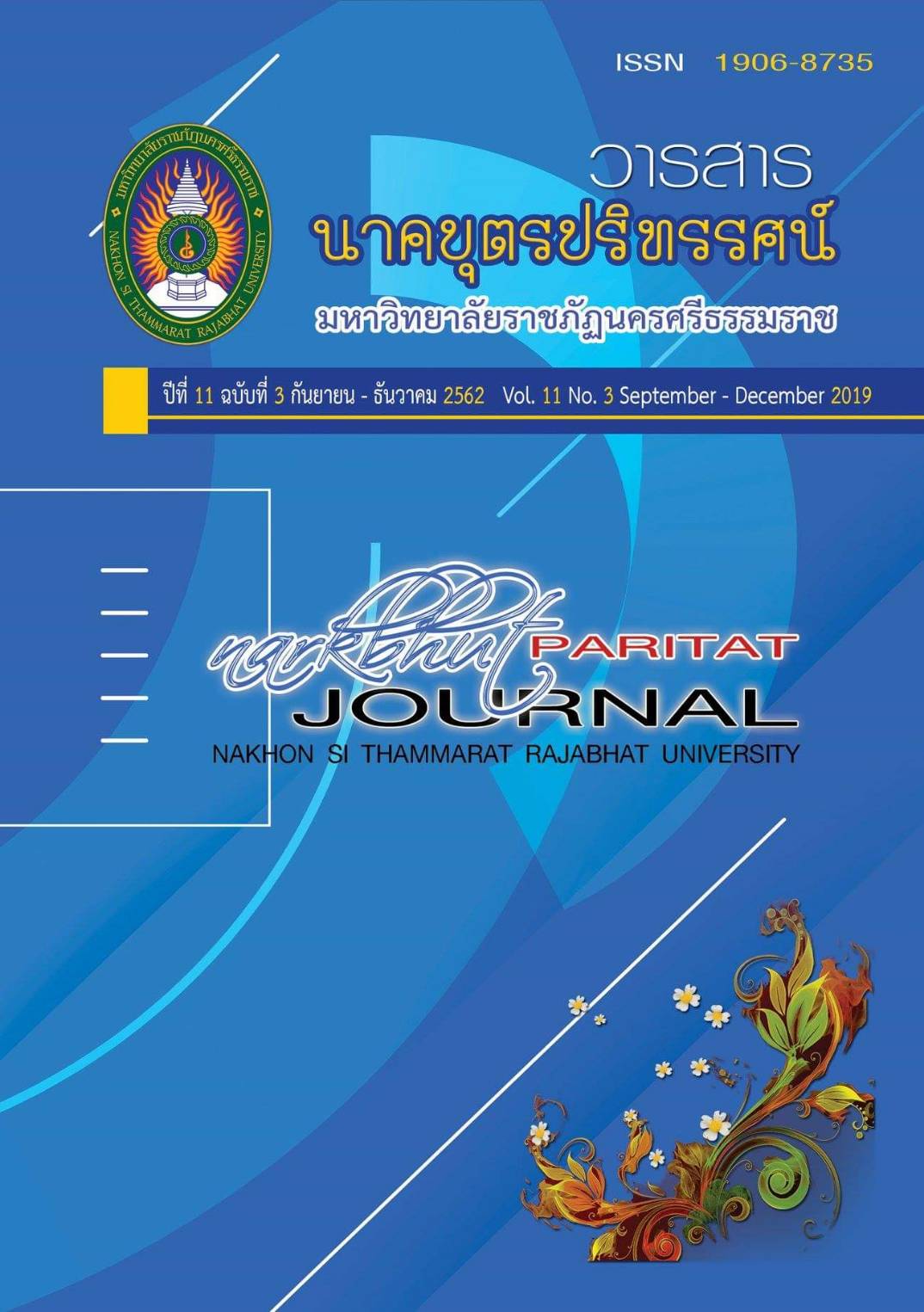มังคละพิษณุโลก : การประสมวง พิธีกรรม และความเชื่อ MANGKALA PHITSANULOK : ORCHESTATIONMIXING RITUALS AND BELIEFS
Main Article Content
บทคัดย่อ
การศึกษาวิจัยครั้งนี้ ได้กำหนดวัตถุประสงค์ของการวิจัยไว้ 2 ประการ คือ 1) เพื่อศึกษาการประสมวงของมังคละในเขตจังหวัดพิษณุโลก 2) เพื่อศึกษาพิธีกรรมและความเชื่อเกี่ยวกับมังคละในเขตจังหวัดพิษณุโลก โดยใช้ระเบียบวิธีวิจัยเชิงคุณภาพ ด้วยวิธีการศึกษาข้อมูลจากเอกสาร และศึกษาข้อมูลจากภาคสนามด้วยวิธีการสำรวจ การสังเกต และการสัมภาษณ์ ผลของการศึกษาพบว่า การประสมวงของมังคละในเขตจังหวัดพิษณุโลก มีมาแล้วก่อน พ.ศ. 2444 ลักษณะเครื่องดนตรีที่ใช้ในการประสมวงทั้งหมดมีลักษณะคล้ายกับเบญจดุริยางค์แบบอินเดีย โดยมีเครื่องดนตรีหลักจำนวน 5 ชิ้น ได้แก่ ปี่มังคละ กลองมังคละ กลองยืน กลองหลอน และฆ้องโหม่ง 3 ใบ ต่อมาประมาณ พ.ศ. 2485 วงมังคละได้มีวิวัฒนาการเพิ่มฉาบยืน ฉาบหลอน กลองรำมะนา กรับ และฉิ่งมาโดยลำดับ ด้านพิธีกรรมกับมังคละในเขตจังหวัดพิษณุโลก พบว่า วงมังคละยังรักษาพิธีกรรมไหว้ครูอยู่อย่างเคร่งครัด โดยแบ่งออกเป็น 3 ลักษณะ ได้แก่ ไหว้ครูประจำปี ไหว้ครูเพื่อฝากตัวเป็นศิษย์ และไหว้ครูก่อนการแสดง ด้านความเชื่อเกี่ยวกับมังคละในเขตจังหวัดพิษณุโลก พบว่า 1) โอกาสที่ใช้บรรเลงในอดีตสามารถบรรเลงได้ทุกงานปัจจุบันไม่นิยมบรรเลงในงานศพ 2) เครื่องดนตรีที่ไม่มีการสืบทอดต่อ มักนำเครื่องดนตรีดังกล่าวไปเก็บไว้ที่วัด หรือ ถวายวัด 3) เชื่อว่าหากได้ยินเสียงกลองดังเองโดยไม่มีคนตี จะต้องมีเจ้าภาพมาจ้างวงดนตรีไปแสดง 4) เชื่อว่ามังคละเป็นเครื่องดนตรีที่ศักดิ์สิทธิ์ ผู้ใดได้ฟัง ได้บรรเลงแล้ว จะทำให้นำแต่สิ่งที่เป็นสิริมงคลเข้ามาสู่ชีวิต 5) นักดนตรีมีความเชื่อสืบต่อกันมาว่า เครื่องดนตรีเปรียบเสมือนตัวแทนครูเครื่องดนตรีที่ใช้บรรเลงเสร็จแล้ว เก็บไว้ที่หิ้งสูงๆ และไม่นำไว้ใต้ถุนบ้าน จะนำไว้บนบ้านเท่านั้น 6) เชื่อว่าห้ามข้ามเครื่องดนตรี ซึ่งจะทำให้ผิดครู จะเกิดสิ่งไม่ดีขึ้น และทำให้ชีวิตตกต่ำลง 7) การทำกลองมังคละมักจารตัวอักขระคาถา “นะชาลิติ” ลงบนหน้ากลองมังคละ เพื่อให้เกิดความขลังและศักดิ์สิทธิ์หากตีเมื่อใดเชื่อว่าเสียงจะดังกังวาน เป็นที่นิยมชมชอบแก่ผู้ที่ได้ยินได้ฟัง เป็นต้น
This research study Has determined the objectives of the research in 2 ways: 1) to study the composition of Mangosteen in Phitsanulok Province 2) to study the rituals and beliefs about mangosteen in Phitsanulok Province By using research methods Qualitative by means of studying data from documents Study the field data using the survey method. Observe the interview with the following research results. It was found that the evidence has been mixed before before 2001. The musical instrument used in the whole ensemble is similar to the Indian genus. With 5 main musical instruments, including mangosteen, drums, mangosteen, drums, drums, hallucinations and tackles In the ritual and mangosteen in Phitsanulok province, it was found that the mangka band still preserves the ceremonial worship. Which is divided into 3 characteristics, namely, annual Wai Khru Wai Kru to leave as a disciple And worshiping before the performance Regarding the beliefs about mangosteen in Phitsanulok province, it was found that 1) Opportunities that were used in the past can be played at every current event, not popular in the funeral. Often bring such instruments to be kept at the temple or offer temples 3) If the loud drum sounds are heard, the host must have a work 5) There is a belief that mangosteen is a sacred instrument that anyone can listen to. Will bring only the things that are auspicious into life. 6) Musicians have a belief that The instrument is like a teacher representative. The instrument used to play is finished. Kept at a high shelf And not brought under the house Will be put on the house only Which will make the teacher wrong (Not good to the teacher) will not happen better And causing the life to fall down. 8) The mangrove drumming often engages the character of the spell "Nachaliti" on the mangosteen drum. To create magical and sacred If hit when believing that the sound will ring It is popular with those who hear it.
Article Details
เอกสารอ้างอิง
Mangkhala Mangkhala Mangkhala Music Band of the Office of Arts and Culture of
Pibulsongkram Rajabhat University to Inherit the local Wisdom Culture in
the Lower Northern Region. (Master of Doctor of Philosophy Thesis). Mahasarakham University, Graduate School. (in Thai).
Lookplub, P. (2018, October, 1). Club president Mangkhala Phitsanulok Province. 107 Mu 5 Tha Pho Sub-district, Muang district, Phitsanulok Province. (Interview).
Morgan, L. H. (2010). Ancient Society or Researches in the Lines of Human Progress from
Savagery through Barbarism to Civilzation. Chicago: Charles H. Kerr & company.
Phoasai, S. (2018, October, 25). Musician Mangkhala. 34/2 Mu 4 Chomthong Sub-district, Muang district, Phitsanulok Province. (Interview).
Rungruang, P. (2009). Documents for academic conferences about music, rituals In occasion
75th Anniversary of Thammasat University and the 37th Thai Higher Music Education
Event. Bangkok: Tech Promotion and Advertising Co., Ltd. (In Thai).
Satthathunyakan, B. (2018, October, 1). Band leade Mangkhala Wang Chan. 56 Mu 5
Plaichumpol Sub-district, Muang district, Phitsanulok Province. (Interview).
Sirikochapan, S. (1997). Mangkhala in Phitsanulok Province. (Master of Arts Thesis). Mahidol
University, Major Cultural Science Graduate Studies Building. (in Thai).
Thongin, T. (2018, October, 22).. Band leade Mangkhala Phai Kho Don. 72 Mu 5
Phai Kho Don Sub-district, Muang district, Phitsanulok Province. (Interview).


